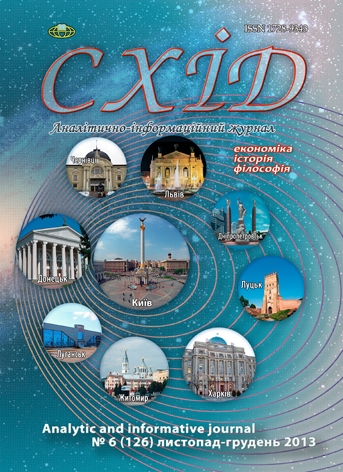The Donetsk's myth. Ontologi of the citys self-definition
DOI:
https://doi.org/10.21847/1728-9343.2013.6(126).20724Keywords:
the myth city's, myths of the city, Mythology of the city, regional identityAbstract
One of the main trends of modern society is a marked increase of the theoretical interest to the sphere of mythology and the theory of myth. And in light of globalization approaches explicitly focus on the impact study of the regional aspects of social phenomena. In this regard, in regional studies of mythology appear attempts seen the myth city's as a socially formalized knowledge about the city or region, a strong regulatory and mobilization element in society, which is capable of forming a regional entity and identity.
A problem is in that every city has the own myths and specific municipal culture. It can be one of reasons of conflicts at co-operation of townspeople of different regions because all of us are inclined to identify itself with a sub-group on the sign of place of inhabitation, line of business or the world view.
Thus, at all cities have different myths and symbols. We are inclined to see our city as city of the chosen townspeople, while other cities and regions are inhabited by demons and monsters. The article suggests to consider the city like a self-valuable phenomenon.
The article submitted to scientific use of the term "the myth city's" which, the author's perspective is not identical to the concept of "myths of the city" and "Mythology of the city." also authors conducted analysis the history of the formation of the Donetsk's myth, identified the main stages of its formation, and conducted explication of its meaningful and functional characteristics.
Downloads
References
Білецька В. Шахтарські пісні / В. Білецька // Етнографічний вісник. - 1927. - № 5. - С. 55-59.
Куромія Г. Свобода і терор у Донбасі: Українсько-російське прикордоння, 1870-1990-ті роки / Гіроакі Куромія. - К. : Основи, 2002. - 510 с.
Миронович Д. В. Релігійний простір міста (на прикладі міста Донецька) / Д. В. Миронович // Сучасні суспільні проблеми у вимірі соціології управління : зб. наук. праць ДонДУУ : Соціологія управління. - 2008. - У 12 т. - Т. IX. - Вип. 4 (94). - С. 315-323. - (Серія : Спеціальні та галузеві соціології).
Покровский П. А. Как живет донецкий шахтер (по анкетным данным) / П. А. Покровский // Русское багатство. - 1913. - № 12. - С. 241-261.
Страна огня: Произведения рус. писателей о Донбассе : в 2-х т. / [сост., предисл. и вступ. статьи к разд. К. Ф. Спасенко]. - Донецк : Донбас, 1979. - Т.1. 400 с.
Тараненко О. В. Донецкая мифология: смена концептов, или Уголь, Розы и Футбол / О. В. Тараненко // Метафізика Донецька. Філософські есе. - Донецьк : Донецьке відділення Наукового товариства ім. Шевченка, ТОВ "Східний видавничий дім", 2012. - С. 86-110.
Тимофєєв П. Т. Пісенний фольклор робітничого середовища Донбасу (на матеріалі записів 20-х рр. ХХ ст.) / П. Т. Тимофєєв. - Донецьк : Юго-Восток, 1997. - 182 с.
Юнгер Э. Рабочий. Господство и гештальт; Тотальная мобилизация; О боли / Э. Юнгер. - СПб. : Наука, 2000. - 539 с. - (Серия "Слово о сущем").
REFERENCES
Biletska V. (1927), Journal of ethnographic, 5, рp. 55-59. (ukr).
Kuromiia Hiroaki. Freedom and Terror in the Donbas: A Ukrainian-Russian Borderland, 1870s-1990s., Оsnovy, Кyiv, 510 p. (ukr).
Myronovych D. (2008), The religious space of the city, IX, 4 (94), pp. 315-323. (ukr).
Pokrovskiy P. (1913), Russian wealth, 12, рp. 241-261 (rus).
Spasenko K. F., comp. (1979), Сountry of fire, Donetsk, Donbas, 400 p. (rus).
Taranenko О. (2012), Metaphysics Donetsk. Philosophical essays., Ltd East Publishing House, Donetsk, рp. 86-110 (rus).
Tymofieiev P. (1997), Song folklore working environment of Donbass, Southeastward, Donetsk, 182 p. (ukr).
Yunger Ernst (2000), Working. Domination and Gestalt, Science, Saint Petersburg, 539 p. (rus).
Downloads
Published
How to Cite
Issue
Section
License
Copyright (c) 2014 Aleksandr Belokobylskiy, Kseniia Sidorova

This work is licensed under a Creative Commons Attribution-NonCommercial-NoDerivatives 4.0 International License.
1. Authors bear responsibility for the accuracy of facts, quotations, numbers and names used.
2. Manuscripts are not sent back.
3. The publisher does not always agree with the authors' opinion.
4. The authors reserve the right to authorship of the work and pass the first publication right of this work to the journal under the terms of a Creative Commons Attribution-NonCommercial-NoDerivatives 4.0 International License. This license allows others to distribute (copy) the published work for non-commercial purposes, provided there is mandatory attribution to its authors and a link to the first publication in our journal.
5. The authors have the right to conclude separate supplement agreements that relate to non-exclusive work distribution in the form in which it has been published by the journal (for example, to upload the work to the online storage of the journal or publish it as part of a monograph), provided that the reference to the first publication of the work in this journal is included.

